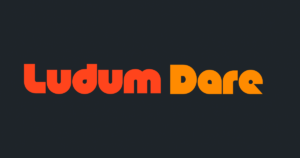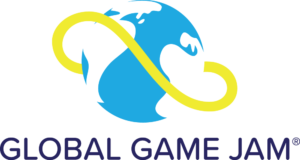Before we Begin: Portfolios
As soon as you can, make a few tracks that illustrate what you can do. You can even start with some generic video game music themes: overworld, dungeon, ice world, etc. Host them for free on a website like Bandcamp or SoundCloud, that way you have material to share when you start looking for projects. Once you have a few projects under your belt, you can use those tracks and create an audio-only portfolio album (like I have here) or make a video portfolio to fully show off how your music works in game. I just use a webpage to showcase that album, clips from games I’ve worked on, and social media posts from creators that feature my music. You can record your gameplay using OBS (Open Broadcasting Software) and edit the recordings with OpenShot.
Game Jams
When you’re first starting out, you’ll most likely be working on small games and hobby projects. You’ll hear this echoed time and time again from other game audio folks—the best way to find your first few projects is through game development events called “game jams”. During these events, folks who work in all aspects of the development process (art, programming, sound, direction, etc.) form teams and create a game within a set timeframe and usually within some constraints/themes. Everyone is creating for the love it and looking to meet new people in the scene. Some folks even end up remaining on a team to polish their game to bring it to full release! Two of my biggest projects were found by meeting developers doing jams. All in all, it’s a fantastic way to start writing music specifically for games, understand the game development process and working with a team, as well as start gathering material for your eventual portfolio. Below are some resources for locating them.
Itch.io

The #1 spot for game jams, in my humble opinion. They have a dedicated section of their website just for them. Multiple jams are happening everyday, and Itch makes it easy to find a team through each event’s message board. Go in there, say you’re a musician looking to work with someone, and share a link to some pieces you’ve written.
Ludum Dare

This is a bi-annual game jam (April and October) and I believe the biggest one on the internet. Literally thousands of games of great quality are submitted per event.
Global Game Jam

This is an in-person event, however there are hundreds of sponsored locations all around the world where you can participate.
Other places
I truly believe that jams are the best way to get started. Everyone is there for the love of making games, and your services will be needed. There are other places where game development is discussed online, but many are more so geared toward receiving feedback and general sharing, not to garner solicitations for audio help. Make real connections here first before asking if they need anything. There are a few exceptional times when folks will post specifically looking for audio help, but you need to act quickly on those, as everyone and their mother will submit for consideration.

Twitter has a huge game development community. Hashtags like #gamedev, #indiedev, and #gameaudio are constantly being used to share works-in-progress.

I, like everyone, have a love-hate relationship with Reddit. On one hand, you can find specific information from specific communities. On the other, there’s that whole “hive mind” thing, and people can be very unkind for seemingly no reason.
In any case, there are a few subreddits, namely r/Gamedev and r/INAT(I Need a Team), where different walks of the game development community can share their projects and ask questions. You can make your own posts looking for projects, but keep in mind that there will be several others right behind you. A lot of hobbyists post here, but I have seen a few paid opportunities pop up.
TIGSource Forums

A classic forum-style website where creators update share their works. There are even specific boards for the different disciplines that go into game development (art, programming, music, etc.). Note that because it’s so well-known, you’ll often find tons of other musicians already commenting on posts.
Freelance sites like Upwork and Fiverr
Note: these are freelance sites where you can bid on projects. I’m including them as a taste for what’s out there in terms of gigs, but everything beyond is out of the scope of this guide.
I’ve never had success here. I don’t even think I was admitted to the secret inner circle where I could actually bid for projects. You’ll be competing with tons of other folks for sometimes completely unfair wages. This is just me, but I’d much rather work in a passionate group for free than fight tooth and nail for scraps.
Conclusion / Quick note about spamming
To me, one of the worst things you can do to another creator is being disingenuous to disguise your own ulterior motive. I repeatedly saw a musician on TIGSource who would copy and paste basically the same message on every developer’s project:
“Wow, love the art style, it looks so cool. Do you need any help with music by the way?”
I’m not kidding, it was almost the exact same thing every single time. Only comment on something if you really mean it, and don’t ask if they need audio help at the same time. Everyone can see right through a message like that. That’s why game jams are so great—they’re an organic way to fill a need and meet people to work towards a common goal. One of the most fruitful things you can do when starting out is build natural relationships with other creators.
This isn’t to say that you can’t or shouldn’t reach out to people to offer your services, but there’s a proper way to do that that’s outside of the scope of this writing. And when you’re first starting out, you’ll want to dip your toes in the water with projects that are full of collaboration, mutual respect, and love for the medium. You’ll find those most often in game jams.
